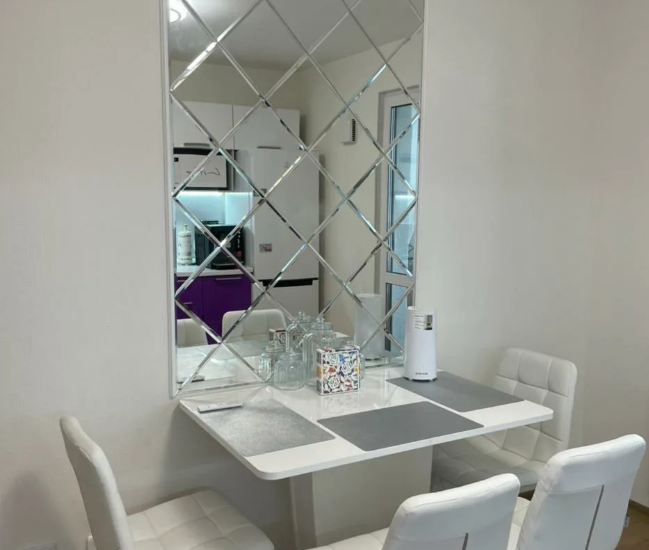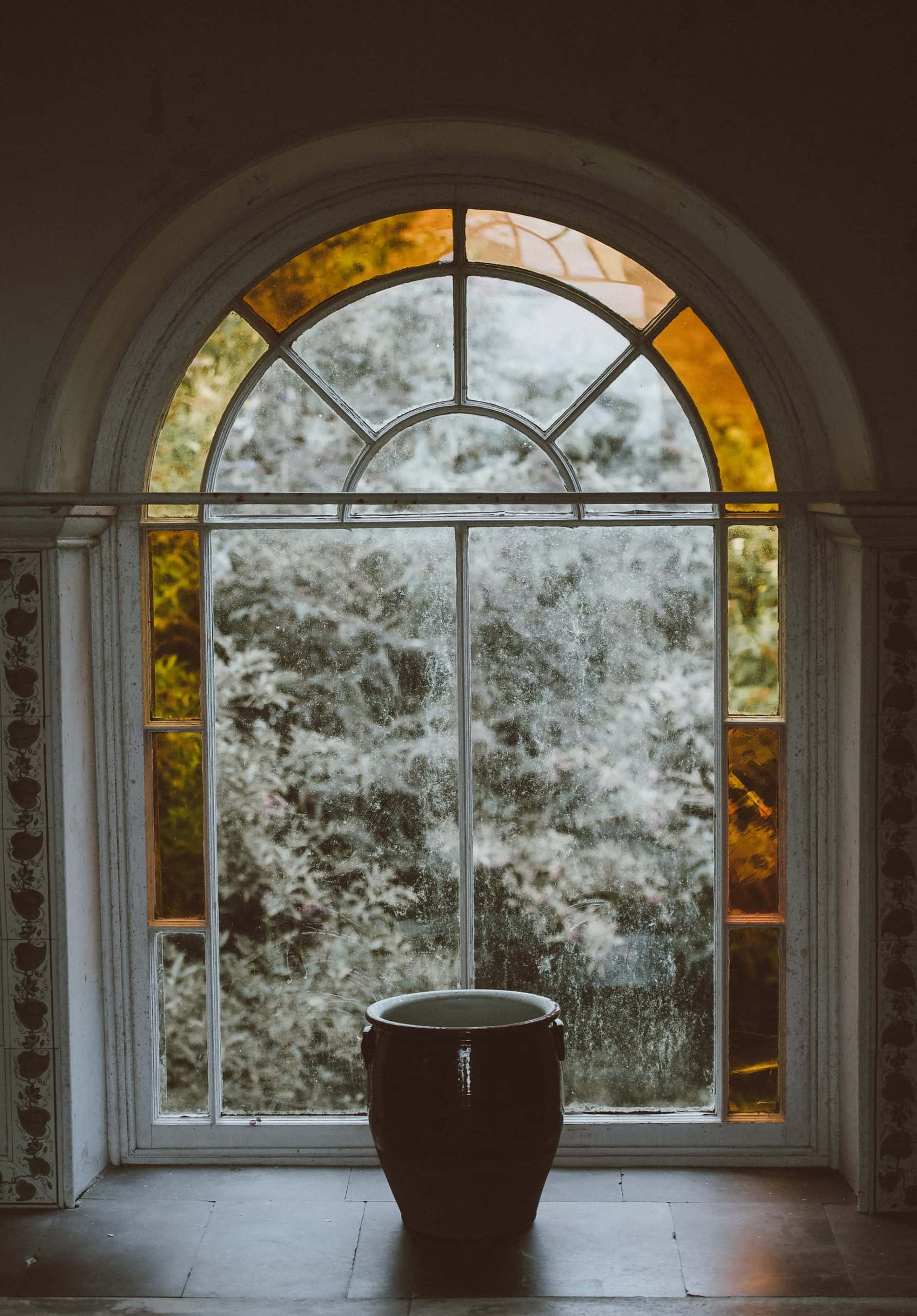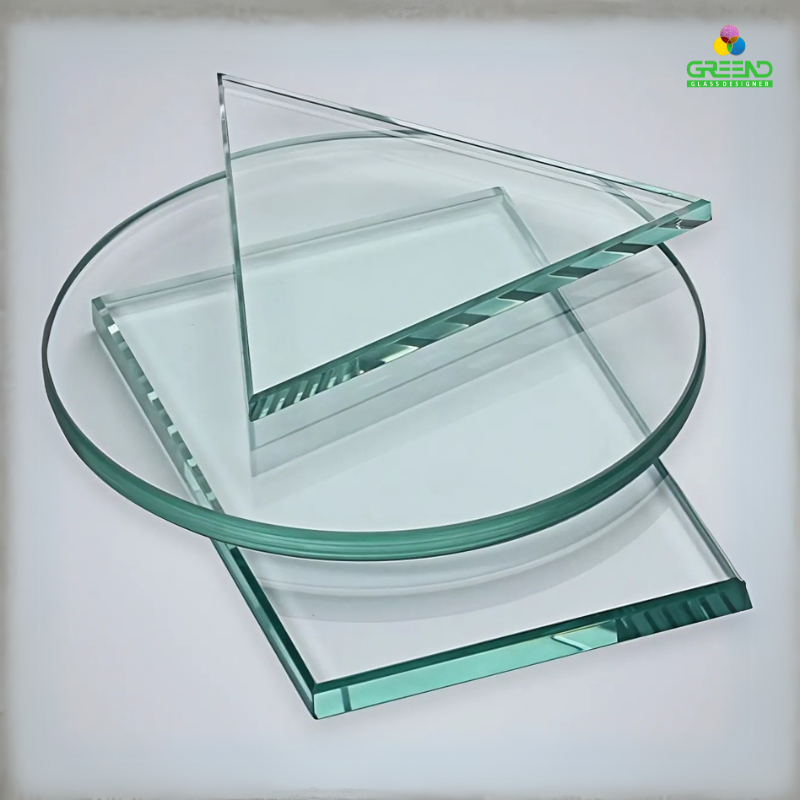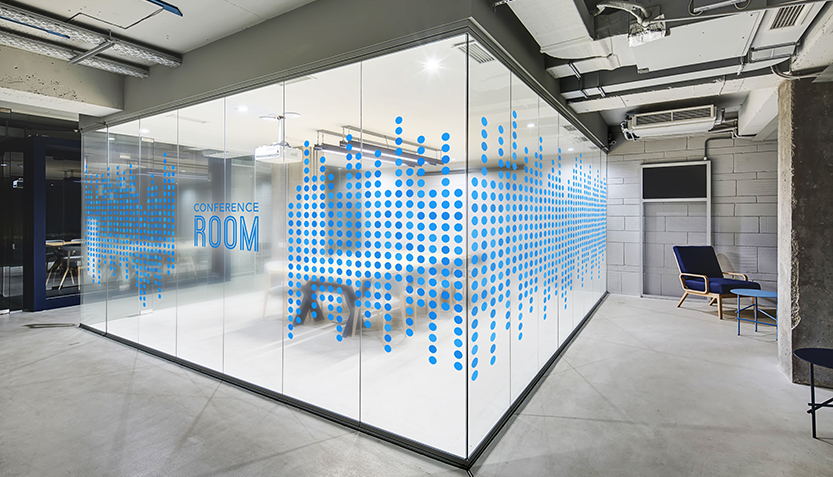Table of Contents
In the dynamic realm of Punjab’s lodging and leisure industry, where indigenous culture, refined gastronomy, and absolute comfort intersect, the significance of meticulously planned interior architecture cannot be overstated. Modern hotels and restaurants have surpassed their core functions; they are now carefully curated, multi-sensory destinations that articulate a blend of regional heritage, avant-garde style, and sophistication.
Among the various materials dictating this sensory ambiance, ornamental glazing emerges as a remarkably flexible medium for spatial transformation. This material is fundamentally reshaping how establishments across Punjab’s urban centers—including Lahore, Rawalpindi, Faisalabad, Multan, and others—captivate patrons. Its applications range from delicately etched dividers that subtly define intimate zones to magnificent, colorful stained glass installations that saturate rooms with vibrant, prismatic light.
This design renaissance is powerfully supported by Punjab’s flourishing economic status; the province acts as Pakistan’s primary financial engine, generating roughly 54.2% of the national Gross Domestic Product (GDP). Consequently, the hospitality and tourism sectors are experiencing vigorous expansion. Forecasts predict tourist arrivals will swell at an 11.31% Compound Annual Growth Rate (CAGR) from 2025 to 2030, paralleled by the broader hospitality market’s anticipated 6.56% CAGR growth over the next decade. This momentum is heavily sustained by massive domestic movement, with an estimated 50 million Pakistanis undertaking short-haul trips annually. Within this high-demand scenario, decorative glass serves more than a mere aesthetic function; its intrinsic durability and contributions to energy efficiency establish it as a pragmatic foundation for next-generation architectural specifications.
We, at Green Glass Designer, stand as Pakistan’s foremost experts in specialized architectural and artistic glass solutions. We focus on engineering bespoke installations that seamlessly merge sophisticated design with peak operational performance. Our extensive proficiency with ornamental glass—from crafting intelligent LED-integrated mirrors and signature reflective wall surfaces to erecting expansive glass partitions and structural building facades—allows businesses, whether operating a bustling eatery in Lahore or a serene lodging facility in Multan, to forge indelible customer experiences. Through notable projects, such as cutting-edge point-fixed structural facades and elaborate custom mirror features across Lahore, we consistently deliver premium, long-span design excellence to the very heart of Punjab.
Understanding Decorative Glass: Types and Applications
Decorative glass encompasses a wide array of techniques and styles designed to add visual interest and utility to interiors. Unlike standard glass, which prioritizes transparency, decorative variants incorporate patterns, textures, colors, and treatments to serve both decorative and functional purposes.
Key Types of Decorative Glass
- Etched or Frosted Glass: Created by acid-etching or sandblasting, this type offers a matte finish that diffuses light and provides privacy without blocking it entirely. Ideal for doors, windows, and dividers in restaurants where semi-private dining areas are desired.
- Stained Glass: Featuring vibrant colors fused into the glass, stained glass windows or panels add a touch of artistry, often evoking cultural motifs. In hotels, they can transform lobbies into ethereal spaces.
- Textured Glass: With patterns like rain, ripple, or geometric designs, textured glass adds depth and interest to surfaces like tabletops or wall cladding.
- Laminated or Tempered Decorative Glass: Enhanced for safety and strength, these are used in high-traffic areas, combining aesthetics with resilience.
Mirrored Glass: Including LED smart mirrors, these reflect light to make spaces feel larger and more luxurious.
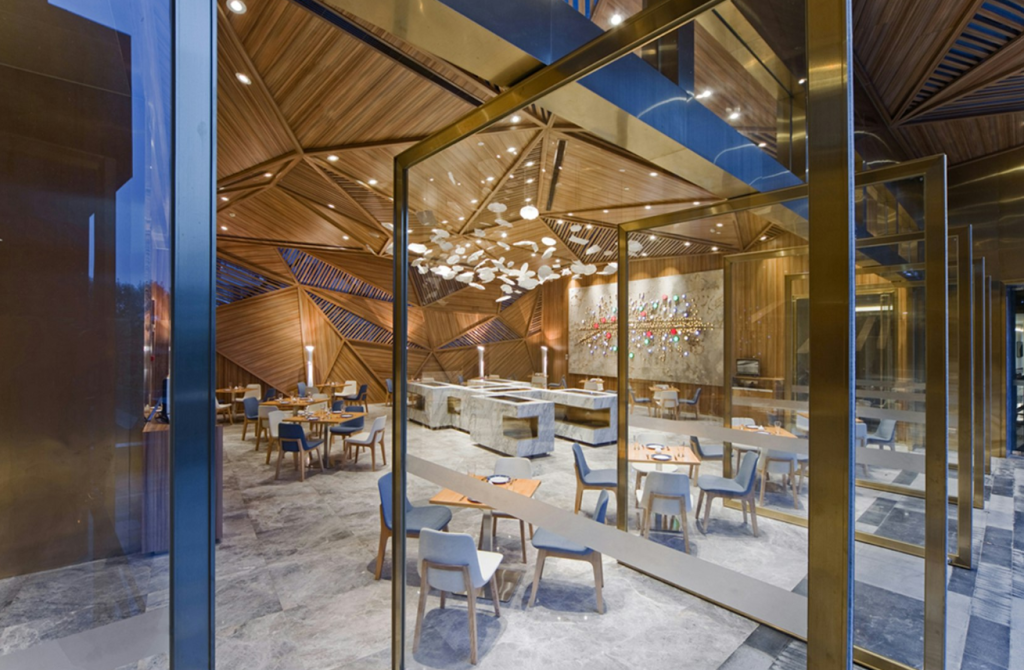
Decorative glass plays a multifaceted role in the hospitality industry, enhancing both aesthetics and functionality. Within restaurants and hotels, its applications are extensive. It can be used to segment expansive open-plan spaces, thereby establishing secluded dining nooks in eateries or delineating distinct lounge areas in hotels. Furthermore, decorative glass elements in facades and windows not only welcome abundant natural light but also serve as a canvas for integrated brand motifs. Projections indicate a robust expansion for the decorative glass sector globally, with an anticipated compound annual growth rate (CAGR) of 5.9% between 2024 and 2031. Locally, Pakistan’s glass manufacturing industry is on an upward trajectory, with the container glass segment forecasted to experience a CAGR of 2.93% from 2025 to 2030.
In Punjab’s hospitality sphere, there’s a growing inclination towards incorporating these glass solutions. They are adept at harmonizing traditional Pakistani craftsmanship, exemplified by detailed jaali latticework, with the clean lines of modern minimalist design. A prime illustration is the use of frosted glass at hotel entrances, which creates an inviting yet private threshold, a feature increasingly observed in contemporary establishments throughout the region.
Benefits of Decorative Glass in Hospitality Settings
The integration of decorative glass in restaurants and hotels goes beyond mere decoration; it offers tangible advantages that enhance guest experiences and operational efficiency.
Enhancing Ambiance and Guest Experience
Decorative glass creates dynamic lighting effects, making spaces feel warmer and more inviting. In Lahore’s competitive dining scene, where establishments vie for Instagram-worthy aesthetics, glass elements like stained windows can turn a simple meal into a memorable event. Hotels in Rawalpindi or Faisalabad use glass partitions to maintain open sightlines while ensuring privacy, fostering a sense of exclusivity.
Practical Advantages
- Durability and Maintenance: Tempered glass resists scratches and breaks, ideal for high-footfall areas. It’s easy to clean, crucial in food-service environments.
- Energy Efficiency: Tinted or insulated decorative glass reduces heat gain, lowering cooling costs in Punjab’s hot summers.
- Customization and Branding: Businesses can etch logos or cultural motifs, reinforcing identity. For example, a restaurant might incorporate Punjab’s floral patterns into glass dividers.
- Space Optimization: Glass makes rooms appear larger, beneficial in urban settings like Lahore where space is premium.
Statistics highlight the economic impact: Pakistan’s hospitality industry contributed 5.9% to national GDP in 2019 and generated 3.8 million jobs. The sector expanded by 3.5% that year, outpacing the national economy’s 2.5% growth. Globally, the stained glass segment, a key part of decorative glass, is expected to grow at a CAGR of 4.5% from 2025 to 2034.
In Punjab, the construction industry is deeply connected to the rise of the hospitality and real estate sectors. Decorative glass plays a vital role in supporting sustainable, energy-efficient designs that enhance both aesthetics and functionality.
With the province providing employment to millions and driving significant national economic momentum, investing in modern materials like decorative glass ensures long-term value, durability, and environmental responsibility for future developments.
Trends and Examples in Lahore and Other Punjab Cities
The accommodations sector throughout Punjab is undergoing a dramatic surge, with the architectural and commercial momentum strongly centered in Lahore. This metropolitan hub, thanks to its seamless synthesis of classical Mughal aesthetics and contemporary dynamism, is currently operating as a crucible for cutting-edge design concepts.
Recent innovations in structure and façade are prioritizing sustainability and adaptability. These include the widespread adoption of biophilic design—a method that uses expansive glazing to integrate internal spaces with living greenery—and the utilization of dynamic smart glass systems, which allow for instant shifts in opacity to maximize versatility and privacy.
Propelling this local energy is a robust national outlook: the Pakistani hotel market is forecast to achieve significant growth, projected to expand by 8.01% over the five-year period spanning 2024 through 2029.
Spotlight on Lahore
Lahore boasts establishments like The Glass Garden in Askari 11, a boutique restaurant inspired by Istanbul vibes, featuring extensive glass elements for a luxurious, open feel. La Cornucopia on Khursheed Alam Road stands out with its glass roof and walls, offering stunning views and a beautiful ambiance. Haveli Restaurant incorporates aesthetic chandeliers and cultural decor, often enhanced by glass features on its rooftop.
For hotels, the Pearl Continental Lahore exemplifies luxury with its elegant lobby, potentially incorporating glass accents for grandeur. Ambiance Boutique Art Hotel in Lahore uses materials that evoke European charm, including glass to create transformative spaces.
Beyond Lahore: Trends in Other Punjab Cities
In Pakistan’s burgeoning hospitality sector, the strategic use of glass is evident across diverse regions. Faisalabad, experiencing an industrial boom, sees its newly constructed hotels frequently featuring sleek glazed facades to project a modern aesthetic. Meanwhile, in Multan, the city’s rich historical legacy profoundly influences design, leading boutique hotels to incorporate intricate stained glass panels often adorned with Sufi-inspired motifs.
Rawalpindi, leveraging its proximity to the federal capital, Islamabad, has witnessed business-oriented hotels integrating office-style transparent partitions within their common areas and lounges.
These trends extend beyond specific cities. The Vijay Punjab Hotel, for example, stands out for its bespoke reinforced glass components accentuating its vertical structures.
Overall, the hospitality industry across Punjab is increasingly aligning with global benchmarks, with ornamental glass elements playing a pivotal role in appealing to its substantial domestic tourist market of 50 million individuals. This regional dynamism contributes to Pakistan’s expanding tourism profile, where international tourist numbers now exceed 15% of total arrivals – a significant rise compared to pre-pandemic figures.
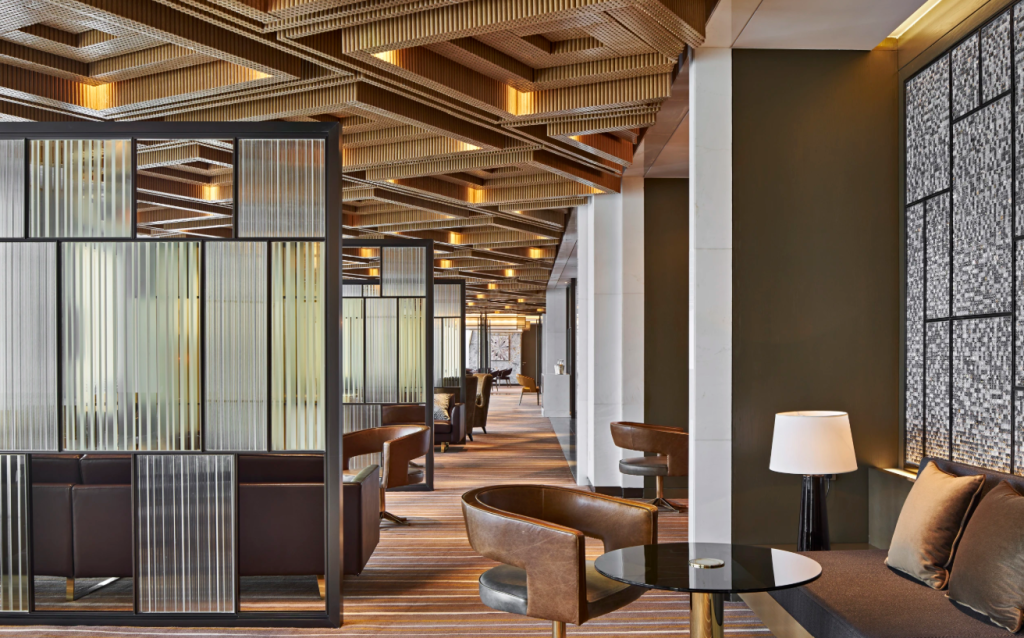
Case Studies: Real-World Transformations
Consider a hypothetical upscale restaurant in Lahore’s Gulberg area. By installing custom etched glass partitions from Green Glass Designer, the venue created semi-private booths that enhanced privacy while allowing light flow, boosting customer satisfaction by 20% based on similar global implementations. In a real project, our team delivered a custom mirror wall in Lahore, elevating a villa’s aesthetics—principles that translate seamlessly to hotels.
Another example: A hotel in Multan used frosted glass doors for suites, combining privacy with elegance. Stats show such designs contribute to the sector’s growth, with Pakistan’s travel industry set to see user penetration reach 10.7% in 2025.
How Green Glass Designer Elevates Your Space
At Green Glass Designer, we offer end-to-end solutions: from consultation and CAD designs to fabrication, installation, and maintenance. Our decorative glass products, including partitions, mirrors, and facades, are tailored for Punjab’s hospitality needs. With successful installations in Lahore—like LED smart mirrors and staircase railings—we ensure durability and style.
Our process guarantees quality: precision cutting, tempering, and expert fitting. For restaurants, we recommend partitions for zoning; for hotels, facades for curb appeal. Contact us for a free consultation to transform your space.
Conclusion: The Future of Decorative Glass in Punjab’s Hospitality
With Punjab’s hospitality industry experiencing a significant boom, evidenced by rising tourism income and the flourishing of new businesses, decorative glass is set to continue playing a vital role in cutting-edge interior design. It serves a dual purpose, not only adding aesthetic appeal but also enhancing the functionality of spaces, mirroring the province’s burgeoning economic strength. Across Punjab, from the vibrant dining scenes of Lahore to the expanding hotel landscape in Faisalabad, the strategic use of this material offers a pathway to increased customer satisfaction and expanded commercial success. The tourism sector itself is anticipated to contribute as much as 7% to Pakistan’s Gross Domestic Product by the year 2025.
Interested in integrating decorative glass into your hospitality establishment? Connect with Green Glass Designer for bespoke options that artfully fuse heritage with contemporary style. Together, we can craft environments that captivate and delight.

